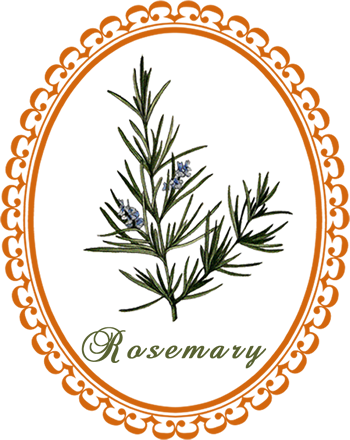
Rosemary: stimulates the brain's nervous system and boosts blood circulation. The herb contains antioxidants that aid memory and protect the body from free radicals, which damage the body's cells ...
Common Names: Rosemary, Guardrobe, Sea Dew
Botanical Name: Rosemarinus officinalis
Family: Lamiaceae
Plant Type: Evergreen shrub
Parts Used: Leaves and stems
Flowering: July
Rosemary is native to Spain, Portugal, southern France, and the western Mediterranean region and is now grown around the world.
Description: Rosemary is an evergreen shrub growing to about three to five feet high, with thin, dark green leaves and pale blue flowers in summer.
Cultivation: Rosemary is hardy to zone 8, growing in well-drained soil in full sun. The seeds have an extremely slow germination, so you may wish to purchase a plant rather than start it from seed.
Harvesting: Harvest the leaves any time. Use fresh, or dry.
Culinary Uses: Rosemary combines especially well with garlic, as well as bay, parsley, and thyme. Use it with lamb , potatoes, beef, or fish; in herb butters and breads; or anywhere you want a tangy, slightly piney flavor.
Rosemary Magick
Protection. Love. Lust. Mental Powers. Exorcism. Purification. Healing. Sleep. Youth
Gender: Masculine
Planet: Sun
Element: Fire
Grow rosemary to attract elves.
Place rosemary under the bed to protect from all harm.
Wash your hands with a Rosemary infusion before doing healing work.
Burn rosemary leaves and juniper berries in sickrooms to promote healing.
Place rosemary beneath your pillow to ensure a good sleep and to drive away nightmares.
Smolder rosemary leaves to purify a room and remove negativity, especially before performing magic.
Herbal Healing with Rosemary
Cosmetic Uses: Rosemary baths refresh and stimulate, and it makes an excellent steam facial. The volatile oils increase circulation to the skin. Rosemary hair rinses brighten brunette hair.
Medicinal Actions: Analgesic, antibacterial, antidepressant, antifungal, antineuralgic, antioxidant, antirheumatic, antiseptic, antispasmodic, antitoxic, antitussive, antiviral, aphrodisiac, astringent, carminative, cephalic, cholagogue, choleretic, cicatrizant, cordial, cytophylactic, decongestant (liver), detoxifier, diaphoretic, digestive, diuretic, emmenagogue, expectorant, hair/scalp tonic, hepatic, hypertensor, insecticide (strong), invigorating, laxative, meditation aid, nervine, parasiticide, pectoral, rejuvenator (skin cells), resolvent, reviving, rubefacient, stimulant (adrenal glands and nerves), stomachic, sudorific, tonic, vulnerary, warming
Medicinal Uses: Rosemary stimulates both the circulation and the nervous system. It is particularly valuable for problems that do with the head - from headaches, falling hair and premature baldness to sleepliness, confusion, absent-mindedness, and depression. Rosemary brings focus and clarity and dispels fogginess. Use it with lavender (Lavendula) and wood betony (Stachys) for headaches. Combine rosemary with ginseng (Panax) or mugwort (Artemesia) for lack of alertness and mental energy. For depression, combine rosemary with St. Johns wort (Hypericum), skullcap (Scutellaria) and wild oats (Avena).
Rosemary contains diosmetin, a flavonoid known to help strengthen the capillaries, which is valuable in the cardiovascular system, where rosemary is used to improve circulation and raise low blood pressure.
Contraindications: People with high blood pressure should avoid the use of rosemary.
Body Care with Rosemary
- To ease mental fatigue, make 1 cup rosemary leaf infusion, inhale the steam, and then drink.
- For dandruff, rinse your hair with rosemary leaf infusion.
Infusion: 1 teaspoon dried or 2 teaspoons fresh rosemary leaves in 1 cup just-boiled water.
Source: The Essential Herbs Handbook by Lesley Bremness
If you appreciate the information provided,
please help keep this website running. Blessings!
© 2008-2025 aromaworx.ca. All rights reserved.

